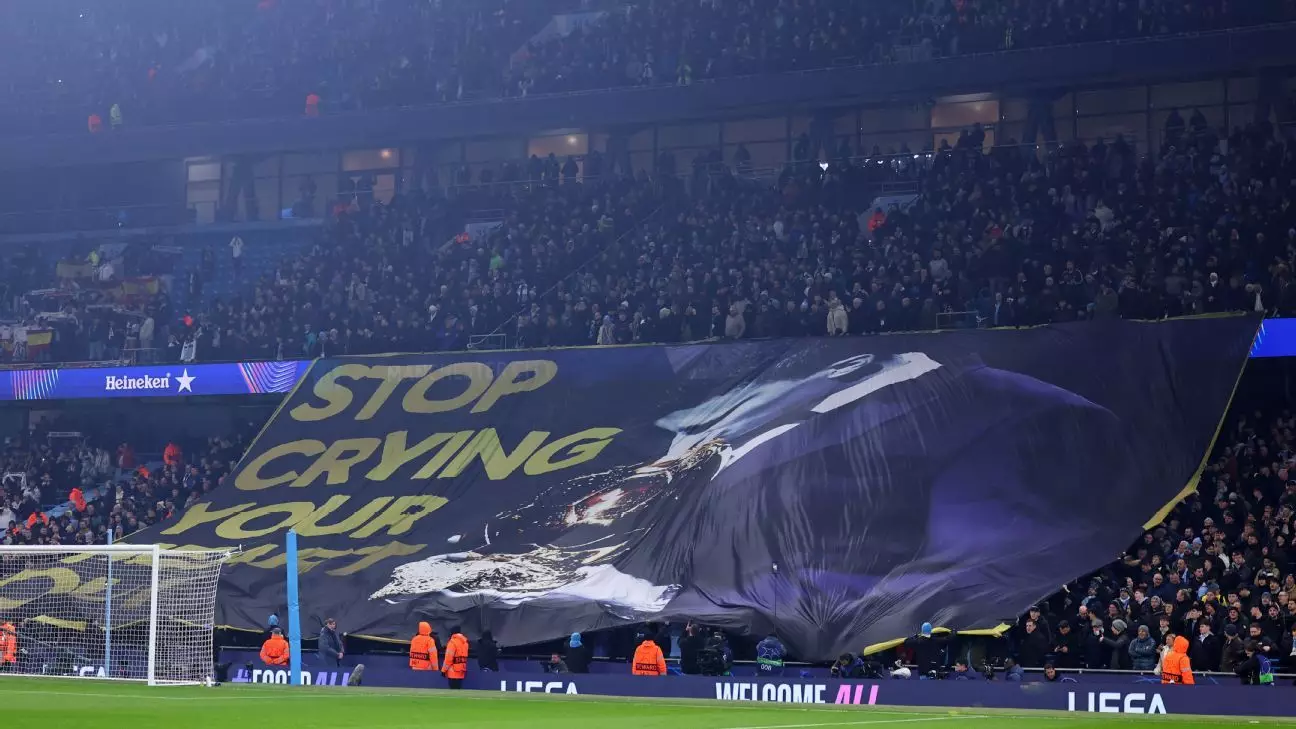The Champions League has long been the pinnacle of club football, and in recent years, remarkably heated rivalries have emerged, particularly between Manchester City and Real Madrid. This competitive landscape is not just about win-loss records, but also about pride and recognition on the European stage. With every match, these two powerhouses amplify the intensity of their encounters, igniting passionate fanfare and captivating storylines that transcend mere statistics.
Leading up to their recent knockout stage clash, fans of Manchester City displayed their humor and rivalry spirit by mocking Real Madrid’s Vinícius Júnior. The fans unfurled a banner featuring City midfielder Rodri kissing the prestigious Ballon d’Or trophy, accompanied by lyrics from Oasis urging their opponents to “Stop crying your heart out.” This cheeky gesture came as a result of Rodri narrowly beating Júnior to the prestigious award, a detail that has not gone unnoticed, particularly by the Madrid faithful.
Vinícius chose to skip the award ceremony altogether, which showcased the tension simmering beneath the surface. Such instances have cultivated a more profound animosity between the two clubs, enhancing the drama of their encounters.
This latest match marked yet another chapter in what is becoming an iconic rivalry. Their encounters in the Champions League knockout stages have become essential narratives in both clubs’ quests for glory, with each team experiencing highs and lows against the other. In the previous season, Madrid edged City in the quarterfinals after a tense penalty shootout that solidified their reputation as perennial champions. On the other hand, the year prior saw City emerge victorious in the semifinals, leading them to complete a historic treble.
These results reflect not just competitiveness but also a cycle of mutual respect and rivalry. Each match is imbued with a sense of urgency, as both teams understand that victory ultimately positions them for potential glory.
Manchester City’s Pep Guardiola has earned the reputation of being one of the best managers in the game, famous for his tactical astuteness and game-day brilliance. Carlo Ancelotti of Real Madrid, too, is a veteran whose wisdom in high-stakes situations has often proven decisive. The matchups between these two managers only add to the layers of complexity in each game, making tactical decisions as crucial as individual performances on the pitch.
Ancelotti himself acknowledged the significance of the match, stating, “It feels like a Clásico now, because we’ve played them now for many years.” Such high praise from the Real Madrid manager underscores the growing importance of this rivalry within the broader context of European football.
As both teams gear up for a decisive battle for supremacy in this year’s Champions League campaign, the stakes could not be higher. Winning against a formidable rival like Real Madrid can considerably boost Manchester City’s aspirations for European dominance. Conversely, Madrid’s pursuit of retaining their status as kings of Europe remains perpetual.
With this escalating rivalry, fans are guaranteed to witness not just skill and talent, but also the raw emotion that comes from two giants striving for greatness. Each leg of their encounters will undoubtedly continue to capture the imaginations of fans and football historians alike, leaving an indelible mark on Champions League lore. In this era, matches between Manchester City and Real Madrid are more than mere games—they are an essential part of football’s evolving narrative, characterized by fierce competition and electric atmospheres.

